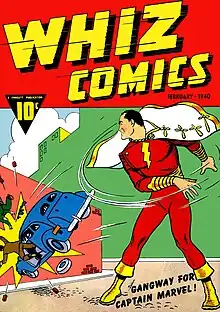Comic book
Comic books are books with comics, with pictures that make a story.[1][2]

Comics were started in the 1800s, a century which saw the development of modern colour printing and many other inventions. Wood engraving was a cheaper type of illustration which was widely used in the 19th century. These things are important because they created an understanding that illustrations are sometimes just as important as words.
The first comic strip appeared in France in 1889, and in the U.S.A. in 1897.[3]
Since the middle 20th century DC Comics and Marvel Comics have introduced superheroes such as Superman, Batman, Wonder Woman, the Flash, Captain Marvel, Teen Titans, Spider-Man, the Incredible Hulk, the X-Men, Iron Man, Captain America, the Mighty Thor, the Avengers and the Fantastic Four. Many comics are about other things. Very often, characters in books, video games, movies and television appear in comics, and sometimes comic book characters are used in movies, TV shows or video games.[4]
Comic books are published in three different forms.
- Single issues that are usually 32 pages long are called comic books. These are printed and bound like a magazine, with the pages folded and stapled together through the centerfold.
- Several comics may be put together in a trade paperback. These have spines like a book and are glued together.
- A bigger comic book that is bound like a trade paperback but is all new, instead of collecting older comics, is called a graphic novel.[5]
In English speaking countries, you read the speech bubbles left to right. Then you read the row below it left to right. This is different from Japanese comics, called manga. Some famous comics are:
References
- Scott Shaw and Mike Kazaleh. 2012. Secret Agent Orange, Annoying Orange #1, New York: Papercutz, December 2012, pp. 61–62.
- Sabin, Roger 1996. Comics, Comix & Graphic Novels: a history of comic art. Phaidon, London. ISBN 0 7148 3993 0
- Couperie, Pierre and Horn, Maurice C. 1968. A history of the comic strip. Crown, New York 1968, translated from the French first edition of 1967, p9.
- Mila Bongco 2015. Reading comics: language, culture, and the concept of the Superhero in comic books. Routledge, p.xv
- Schodt, Frederik (1996). Dreamland Japan: writings on modern Manga. Berkeley, CA: Stone Bridge Press. pp. 19-20. ISBN 978-1-880656-23-5.